|
|
|
Sort Order |
|
|
|
Items / Page
|
|
|
|
|
|
|
| Srl | Item |
| 1 |
ID:
094889
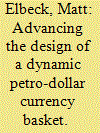

|
|
|
|
|
| Publication |
2010.
|
| Summary/Abstract |
This study offers Organization of Petroleum Exporting Countries (OPEC) member nations a crude oil pricing currency basket based on currency liquidity, in contrast with prior emphasis on OPEC trading patterns. Motivating the search for an alternative US dollar pricing of crude oil is the significant and inverse relationship (r=?0.82, p<0.01) between the US dollar major currencies index and crude oil price over the period January 1999-March 2009. A dynamically weighted petro-dollar currency basket is proposed based on the five currency claims (US dollar, Euro, British pound, Japanese yen and Swiss franc) and their varying proportions of foreign exchange reserves held by central banks. The major currencies US dollar index is compared against the proposed petro-dollar index to reveal an average US$8.1 billion annual gain in favor of the petro-dollar currency basket, offering OPEC members a revenue stream of diversified and highly liquid currencies to transition away from complete dependence on the US dollar crude oil pricing. The proposed petro-dollar crude oil pricing schema offers OPEC a crude oil price dynamically denominated in currencies reflecting the global use and importance of crude oil. This paper concludes with implementation issues facing a move toward the dynamically weighted petro-dollar crude oil pricing schema.
|
|
|
|
|
|
|
|
|
|
|
|
|
|
|
|
| 2 |
ID:
127283
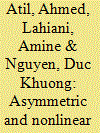

|
|
|
|
|
| Publication |
2014.
|
| Summary/Abstract |
In this article, we use the recently developed nonlinear autoregressive distributed lags (NARDL) model to examine the pass-through of crude oil prices into gasoline and natural gas prices. Our approach allows us to simultaneously test the short- and long-run nonlinearities through positive and negative partial sum decompositions of the predetermined explanatory variables. It also offers the possibility to quantify the respective responses of gasoline and natural gas prices to positive and negative oil price shocks from the asymmetric dynamic multipliers. The obtained results indicate that oil prices affect gasoline prices and natural gas prices in an asymmetric and nonlinear manner, but the price transmission mechanism is not the same. Important policy implications can be learned from the empirical findings.
|
|
|
|
|
|
|
|
|
|
|
|
|
|
|
|
| 3 |
ID:
116752
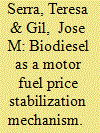

|
|
|
|
|
| Publication |
2012.
|
| Summary/Abstract |
This article studies the capacity of biofuels to reduce motor fuel price fluctuations. For this purpose, we study dependence between crude oil and biodiesel blend prices in Spain. Copula models are used for this purpose. Results suggest that the practice of blending biodiesel with diesel can protect consumers against extreme crude oil price increases.
|
|
|
|
|
|
|
|
|
|
|
|
|
|
|
|
| 4 |
ID:
177441
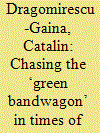

|
|
|
|
|
| Summary/Abstract |
The transition to a low-carbon economy poses significant challenges for investors in energy markets, entailing higher uncertainty and not just higher risks. On the back of the ongoing greening in investment preferences, we focus on investors' group behaviour with respect to U.S. energy equities, which lie at the crossroads in this energy transition phase from an old technology that relies heavily on oil, to a new, greener one. Based on a dynamic herding metric, we find that changes in investors' behaviour with respect to green asset allocations require a better information set than in the case of crude oil allocations, for which only information on returns is a relevant driver of behaviour. We argue that policy uncertainty is better than financial risk proxies in reflecting the multidimensional nature of uncertainty and the various risks associated with investing in green energy today. Our findings suggest the need to reduce uncertainty stemming from the policy realm, given its raising impact on investors’ portfolios on the back of higher allocations towards greener assets.
|
|
|
|
|
|
|
|
|
|
|
|
|
|
|
|
| 5 |
ID:
103345
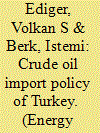

|
|
|
|
|
| Publication |
2011.
|
| Summary/Abstract |
Turkey is one of the most energy import dependent countries in the world, suffering deeply from the economic and strategic burdens of oil importation. Our purpose is to determine the factors behind the crude oil import policy of Turkey and to measure their contribution to a well-organized import strategy. We implemented a principle component analysis to construct an Oil Import Vulnerability Index (OIVI) based on four factors, which are crude oil import dependency of primary energy consumption, crude oil import bill as a share of Gross Domestic Product (GDP), non-diversification of import sources, and share of oil in total energy import. The contribution of these factors to the OIVI is found to be approximately equal. While an overall deterioration in the OIVI has been observed during periods of increasing oil prices, better diversification of oil import sources has lead to significant improvements. We suggest Turkish policy-makers implement sound policies, emphasizing diversification of crude oil import sources and reduction of the share of crude oil in primary energy imports to increase energy supply security. This study has also demonstrated that it is possible to construct an index representing crude oil vulnerability caused by import dependency.
|
|
|
|
|
|
|
|
|
|
|
|
|
|
|
|
| 6 |
ID:
104868
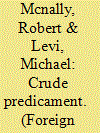

|
|
|
| 7 |
ID:
105981
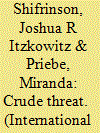

|
|
|
|
|
| Publication |
2011.
|
| Summary/Abstract |
The United States and its Persian Gulf allies have been increasingly concerned with the growing size and complexity of Iran's ballistic missile programs. At a time when the United States and its allies remain locked in a standoff with Iran over the latter's nuclear program, states around the Persian Gulf fear that Iran would retaliate for an attack on its nuclear program by launching missiles at regional oil installations and other strategic targets. An examination of the threat posed by Iran's missiles to Saudi Arabian oil installations, based on an assessment of Iran's missile capabilities, a detailed analysis of Saudi Arabian oil infrastructure, and a simulated missile campaign against the network using known Iranian weapons, finds no evidence of a significant Iranian missile threat to Saudi infrastructure. These findings cast doubt on one aspect of the Iranian threat to Persian Gulf oil while offering an analytic framework for understanding developments in the Iranian missile arsenal and the vulnerability of oil infrastructure to conventional attack.
|
|
|
|
|
|
|
|
|
|
|
|
|
|
|
|
| 8 |
ID:
093620
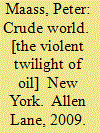

|
|
|
|
|
| Publication |
New York, Allen Lane, 2009.
|
| Description |
276p.
|
| Standard Number |
9781846142468
|
|
|
|
|
|
|
|
|
|
|
|
Copies: C:1/I:0,R:0,Q:0
Circulation
| Accession# | Call# | Current Location | Status | Policy | Location |
| 054697 | 338.27282/MAA 054697 | Main | On Shelf | General | |
|
|
|
|
| 9 |
ID:
099459
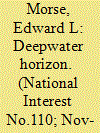

|
|
|
| 10 |
ID:
111868
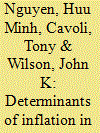

|
|
|
|
|
| Publication |
2012.
|
| Summary/Abstract |
This paper employs a simple macroeconomic model of inflation to empirically investigate the determinants of CPI inflation for Vietnam over the period 2001 to 2009. Vietnam is chosen as our focus for this study because of the country's recent history of high inflation since the end of the Vietnam War in 1975 and the Adjustment of Price reforms in 1985. We are particularly interested in examining the role of the exchange rate in explaining inflation, and of the effect of supply side factors such as the prices of crude oil and rice. Using a range of time series estimation techniques, we find that inflation is persistent and that the money supply, oil prices and rice prices present the strongest influences on CPI inflation.
|
|
|
|
|
|
|
|
|
|
|
|
|
|
|
|
| 11 |
ID:
098053
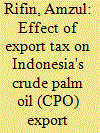

|
|
|
| 12 |
ID:
132771
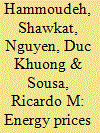

|
|
|
|
|
| Publication |
2014.
|
| Summary/Abstract |
We use a quantile regression framework to investigate the impact of changes in crude oil prices, natural gas prices, coal prices, and electricity prices on the distribution of the CO2 emission allowance prices in the United States. We find that: (i) an increase in the crude oil price generates a substantial drop in the carbon prices when the latter is very high; (ii) changes in the natural gas prices have a negative effect on the carbon prices when they are very low but have a positive effect when they are quite high; (iii) the impact of the changes in the electricity prices on the carbon prices can be positive in the right tail of the distribution; and (iv) the coal prices exert a negative effect on the carbon prices.
|
|
|
|
|
|
|
|
|
|
|
|
|
|
|
|
| 13 |
ID:
138393
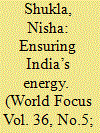

|
|
|
|
|
| Summary/Abstract |
Recent policies on energy which has been adopted by previous and recent governments of India provided new hope. With all these new energy ties, India can aggressively court the Middle Eastern and African countries, as they look for newer customers. Sustainable economic development is a vision and a way of thinking and acting so that we can secure the resources and environment for our future generation.
|
|
|
|
|
|
|
|
|
|
|
|
|
|
|
|
| 14 |
ID:
129227


|
|
|
| 15 |
ID:
153173


|
|
|
|
|
| Publication |
London, Elsevier, 2014.
|
| Description |
xi, 376p.pbk
|
| Standard Number |
9780128010273
|
|
|
|
|
|
|
|
|
|
|
|
Copies: C:1/I:0,R:0,Q:0
Circulation
| Accession# | Call# | Current Location | Status | Policy | Location |
| 059079 | 333.79/TOW 059079 | Main | On Shelf | General | |
|
|
|
|
| 16 |
ID:
167040
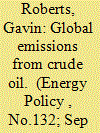

|
|
|
|
|
| Summary/Abstract |
We simulate future global oil production using a model that accounts for oil-deposit heterogeneity, in order to estimate future emissions and global warming associated with oil development. Oil-deposit heterogeneity causes development costs to increase as the stock of oil deposits is depleted. We calibrate our simulations to best estimates of heterogeneous global development costs. The underlying theory implies, and our simulations confirm, that when oil-deposit heterogeneity is large enough, some crude oil may optimally be left in the ground. Our results indicate that increasing degrees of deposit heterogeneity and higher carbon taxes lead to fewer cumulative emissions from oil by 2100, but that the Paris Agreement climate goals will be difficult to meet.
|
|
|
|
|
|
|
|
|
|
|
|
|
|
|
|
| 17 |
ID:
166344
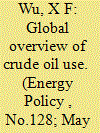

|
|
|
|
|
| Summary/Abstract |
This paper conducts a systems input-output analysis to form an overview of crude oil use in the globalized world economy in 2015. The use of crude oil is tracked from the sources of exploitation to the sinks of final use through the channels of inter-regional trade. This paper finds that the top five oil users, the United States, Mainland China, Japan, South Korea and Canada, are together responsible for half of global oil use. The global volume of oil embodied in trade is twenty percent larger than that in oil exploitation, and the role of the trade of non-oil goods in the global oil balance is comparable to that of the direct oil trade. The United States is the biggest net importer of oil use, in contrast to Mainland China, which is the biggest net importer of direct oil. In order to characterize a region's energy security, new indices for its dependence on external sources of oil are devised. The inter-regional transfer of the environmental burden associated with oil use, leading to the dilemma of “regional decrease at the expense of global increase”, is shown to be inherent to existing energy strategies.
|
|
|
|
|
|
|
|
|
|
|
|
|
|
|
|
| 18 |
ID:
094935


|
|
|
|
|
| Publication |
2010.
|
| Summary/Abstract |
This study analyzes the hedging effectiveness of different hedge type and period by Korean oil traders. Both crude oil price and exchange rate risks are considered. Theoretical models are formulated to estimate the hedge ratios by separate and complex hedge types. The hedging period covers 1-12 months. This study also performs some statistical works to investigate the relationship between the hedging effectiveness and the crude oil price sensitivity to exchange rate. In addition, the relationship between the hedging effectiveness and the volatilities of crude oil price and exchange rate is analyzed.
|
|
|
|
|
|
|
|
|
|
|
|
|
|
|
|
| 19 |
ID:
116214
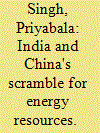

|
|
|
| 20 |
ID:
098093


|
|
|
|
|
|
|
|